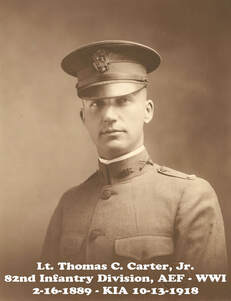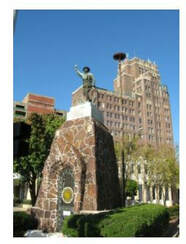
1st Lieutenant Thomas Clay Carter, Jr. began his military service in August 1917, by application and acceptance into Officer's Candidate School at Fort Oglethorpe, Georgia. After graduating from Meridian High School, Thomas was a Cadet Officer at Marion Military Institute and an outstanding baseball player. His education was continued at the University of Virginia, where he was Captain of the baseball team. Thomas Carter was well thought of by all who came in contact with him.
Thomas graduated from Officer's Candidate School in December 1917, receiving a commission and being assigned to the 320th Machine Gun Battalion at Fort Gordon, Georgia. In April 1918, the 320th Machine Gun Battalion and other American units were on the way "Over There" to join the American Expeditionary Force in France. Lieutenant Carter was excited about going to war and the part he would play in the eventual victory. He saw his duty and clearly understood why we were involved and why it was necessary for the Allie Cause to prevail. After reaching France, he saw first hand the horrors visited on the land as well as the civilian population. Thomas also remembered the tales his father told about serving in the Confederate Army. Thomas wrote to his father from France, noting: "my only hope is that I can make as good a record in this war as you made in the Civil War." The 320th Machine Gun Battalion was in action during the St. Mihiel campaign and then moved into the Muse Argonne region for the upcoming battle.
Just after 5 PM, on October 13, 1918, Lieutenant Carter and Goodshall were ordered to reconnoiter new machine gun positions between Marq and St. Juvin, France. Shortly after reaching the area, the two officers came under heavy shell fire from the German lines. Captain Thomas Wert noted in his report that "Lieutenant Carter was struck by shrapnel in the chest and was killed instantly, and Lieutenant Godshall was severely wounded." Godshall was able to make his way back to headquarters, however, he was unable to bring Lieutenant Carter's body with him. Two different search parties were dispatched that night to recover Lieutenant Carter's body. The search parties were unable to locate his body because of the heavy shelling. Because of the Muse-Argonne offensive, Lieutenant Carter's remains were not recovered for four days. Lieutenant Godshall recovered from his wounds only to be a short time later killed in action. A brief military funeral was held at nearby Fleville, France, and Thomas Carter was laid to rest among other comrades. The war ended at 11 o'clock on November 11, 1918, however, the Carter family in Meridian had no knowledge that Thomas had been killed in action. On the night of December 4, 1918, Eugene Carter, an older brother living in Tupelo, was notified by brother in law, Samuel Fowlkes, that Thomas had been killed in Action. Fowlkes, who was married to Irma Carter, sister of Eugene and Thomas, had received the sad news by telegram from Alabama senator Oscar Underwood. Eugene called his brother in law in Meridian, Frank Heiss, and asked that Frank and his wife, Elodie Carter Heiss, go inform Mr. Carter before the sad news appeared in the next day's paper. Thomas Carter was admired by all who served with him, from Officers to enlisted men he commanded. In the Carter Family Collection, at the Lauderdale County Archives, numerous correspondence contains comments by soldiers that served with Lieutenant Carter. Captain Wert wrote to the Carter Family in December 1918: "I regarded him as my best friend and I knew I could see him no more it cast the greatest gloom over me. . . he was by far the best officer in our Battalion." In a later correspondence with the Carter Family, Captain Wert noted that: "He (Lieutenant Carter) was admired, loved, and respected by all who new him and was one of the finest soldiers who ever wore the uniform." The remains of Thomas Carter were moved to the Muse-Argonne Cemetery in March 1919. The family originally requested that Thomas be returned to Meridian for burial in the family plot at Magnolia Cemetery. However, Mrs. Carter had passed away in January 1918, and upon learning that Tom had been killed, Mr. Carter suffered a debilitating stroke. It was then decided to let him rest with other American heroes at Arlington.
On August 28, 1921 Thomas Clay Carter, Jr. returned to America. There were six thousand coffins covered by American Flags on the pier at Hoboken, New Jersey. His number was 0-551. Friends of the family attended the services at Hoboken and wrote brother Eugene: "we went because we knew T.C.'s body was there and we wanted him to have real friends near in the sad homecoming. . . there were thousands present and all with an ache in their heart and tears in there eyes. . . we are glad we could in ever such a small way pay our tribute and express our love for the dear boy who died so gloriously." On September 1, 1921, with several family members present, Lieutenant Thomas Clay Carter, Jr. was laid to rest in Arlington National Cemetery.
The memory and sacrifice of Thomas Clay Carter, Jr., was honored on Memorial Day 2012, by the posthumous award of the Military Order of the Purple Heart. Brigadier General William Crisler, Wing Commander of the 172nd Airlift Wing, MS Air National Guard made the presentation to members of the Carter Family. The Lauderdale County Archives and descendants of Lieutenant Carter, with the assistance of Senator Roger Wick's office, requested that the award be issued in recognition of the sacrifice made by Lieutenant Carter in World War I. The local post Number 21 of the American Legion, proudly bears the name of Lieutenant T. C. Carter, Jr.
Thomas graduated from Officer's Candidate School in December 1917, receiving a commission and being assigned to the 320th Machine Gun Battalion at Fort Gordon, Georgia. In April 1918, the 320th Machine Gun Battalion and other American units were on the way "Over There" to join the American Expeditionary Force in France. Lieutenant Carter was excited about going to war and the part he would play in the eventual victory. He saw his duty and clearly understood why we were involved and why it was necessary for the Allie Cause to prevail. After reaching France, he saw first hand the horrors visited on the land as well as the civilian population. Thomas also remembered the tales his father told about serving in the Confederate Army. Thomas wrote to his father from France, noting: "my only hope is that I can make as good a record in this war as you made in the Civil War." The 320th Machine Gun Battalion was in action during the St. Mihiel campaign and then moved into the Muse Argonne region for the upcoming battle.
Just after 5 PM, on October 13, 1918, Lieutenant Carter and Goodshall were ordered to reconnoiter new machine gun positions between Marq and St. Juvin, France. Shortly after reaching the area, the two officers came under heavy shell fire from the German lines. Captain Thomas Wert noted in his report that "Lieutenant Carter was struck by shrapnel in the chest and was killed instantly, and Lieutenant Godshall was severely wounded." Godshall was able to make his way back to headquarters, however, he was unable to bring Lieutenant Carter's body with him. Two different search parties were dispatched that night to recover Lieutenant Carter's body. The search parties were unable to locate his body because of the heavy shelling. Because of the Muse-Argonne offensive, Lieutenant Carter's remains were not recovered for four days. Lieutenant Godshall recovered from his wounds only to be a short time later killed in action. A brief military funeral was held at nearby Fleville, France, and Thomas Carter was laid to rest among other comrades. The war ended at 11 o'clock on November 11, 1918, however, the Carter family in Meridian had no knowledge that Thomas had been killed in action. On the night of December 4, 1918, Eugene Carter, an older brother living in Tupelo, was notified by brother in law, Samuel Fowlkes, that Thomas had been killed in Action. Fowlkes, who was married to Irma Carter, sister of Eugene and Thomas, had received the sad news by telegram from Alabama senator Oscar Underwood. Eugene called his brother in law in Meridian, Frank Heiss, and asked that Frank and his wife, Elodie Carter Heiss, go inform Mr. Carter before the sad news appeared in the next day's paper. Thomas Carter was admired by all who served with him, from Officers to enlisted men he commanded. In the Carter Family Collection, at the Lauderdale County Archives, numerous correspondence contains comments by soldiers that served with Lieutenant Carter. Captain Wert wrote to the Carter Family in December 1918: "I regarded him as my best friend and I knew I could see him no more it cast the greatest gloom over me. . . he was by far the best officer in our Battalion." In a later correspondence with the Carter Family, Captain Wert noted that: "He (Lieutenant Carter) was admired, loved, and respected by all who new him and was one of the finest soldiers who ever wore the uniform." The remains of Thomas Carter were moved to the Muse-Argonne Cemetery in March 1919. The family originally requested that Thomas be returned to Meridian for burial in the family plot at Magnolia Cemetery. However, Mrs. Carter had passed away in January 1918, and upon learning that Tom had been killed, Mr. Carter suffered a debilitating stroke. It was then decided to let him rest with other American heroes at Arlington.
On August 28, 1921 Thomas Clay Carter, Jr. returned to America. There were six thousand coffins covered by American Flags on the pier at Hoboken, New Jersey. His number was 0-551. Friends of the family attended the services at Hoboken and wrote brother Eugene: "we went because we knew T.C.'s body was there and we wanted him to have real friends near in the sad homecoming. . . there were thousands present and all with an ache in their heart and tears in there eyes. . . we are glad we could in ever such a small way pay our tribute and express our love for the dear boy who died so gloriously." On September 1, 1921, with several family members present, Lieutenant Thomas Clay Carter, Jr. was laid to rest in Arlington National Cemetery.
The memory and sacrifice of Thomas Clay Carter, Jr., was honored on Memorial Day 2012, by the posthumous award of the Military Order of the Purple Heart. Brigadier General William Crisler, Wing Commander of the 172nd Airlift Wing, MS Air National Guard made the presentation to members of the Carter Family. The Lauderdale County Archives and descendants of Lieutenant Carter, with the assistance of Senator Roger Wick's office, requested that the award be issued in recognition of the sacrifice made by Lieutenant Carter in World War I. The local post Number 21 of the American Legion, proudly bears the name of Lieutenant T. C. Carter, Jr.

